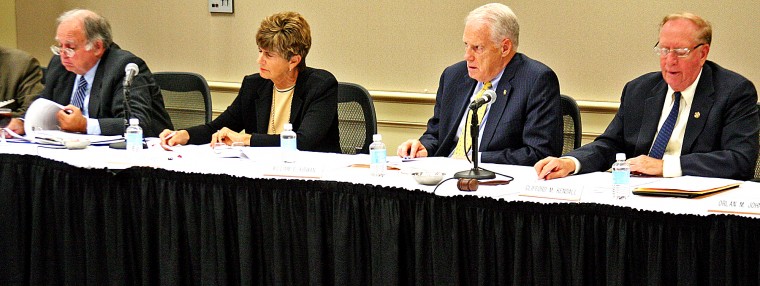
The Board of Regents voted yesterday to not adopt a policy regarding the showing of pornographic films, acting on the recommendation of University System Chancellor Brit Kirwan, center-right.
The university system will not adopt a pornographic film policy, openly defying a state mandate and perhaps resolving a months-long debate on the limits of free speech on campuses across the state.
The Board of Regents — a 17-member panel of gubernatorial appointees that oversees the university system — unanimously voted not to adopt a policy at a meeting yesterday, citing a commitment to free speech and the difficulty of administering such a policy.
The state legislature requested the board craft a policy restricting the viewing of objectionable movies for entertainment after a firestorm erupted surrounding the planned screening of the hard-core pornographic movie Pirates II: Stagnetti’s Revenge last spring.
Top administrators praised the regents’ vote as a victory for free speech and said they were hopeful the state would respect the extensive consideration that went into the decision.
“A university’s ability to discuss controversial and distasteful issues is very important,” university President Dan Mote said. “Everybody has their own view about what is distasteful. … It has been shown repeatedly that it’s very difficult to dictate what is acceptable to all people.”
Vice President for Administrative Affairs Ann Wylie agreed.
“I think they did the right thing,” she said. “I don’t think you can legislate restrictions on free speech. I don’t think you can draw a line between something that’s obscene and something that’s not.”
After learning of plans to screen Pirates II in Hoff Theater last April, state Sen. Andy Harris (R-Baltimore and Harford) threatened to withhold funding for any university that showed a pornographic film for entertainment. Feeling the heat, university administrators canceled the viewing, but students screened part of the movie in Susquehanna Hall in protest. As a part of a compromise, the legislature instructed the board to develop a film policy.
Harris could not be reached for comment yesterday evening.
With assistance from Robert O’Neil, a former president of the University of Virginia and an expert on the First Amendment, university system officials investigated policies that could have required educational components be added to screenings of objectionable films intended for entertainment.
But to avoid running afoul of the Constitution, such a policy would have to be content-neutral, meaning it could not simply target pornographic films, according to a report included in the meeting materials. As a result, many possible policies would require “significant human resources” and could require university officials to be present at every movie intended to be shown for entertainment, the report states.
Even if a policy were constitutionally sound, university system officials said they worried it would be a magnet for costly lawsuits.
“I think an important point here is that such a policy, we are virtually certain, would be challenged because this is such a sensitive issue, and with all the people in the country rightly concerned about First Amendment rights, this would be a target,” University System Chancellor Brit Kirwan said before the vote.
Students have been overwhelmingly opposed to a film policy from the beginning. Last month, students spoke against the policy at a public forum and the Student Government Association unanimously passed a resolution opposing any policy.
“In fact, this issue has very little to do with porn — rather, it is about protecting students’ right to screen entertainment events on campus without the fear of inappropriate outside interference,” SGA President Steve Glickman said in a prepared statement before the vote.
It remains to be seen how the state legislature will react.
“We hope that when they read the report they understand the reasons for the board’s decision,” said university system lobbyist P.J. Hogan, a former Democratic state senator from Montgomery County.
cox at umdbk dot com



